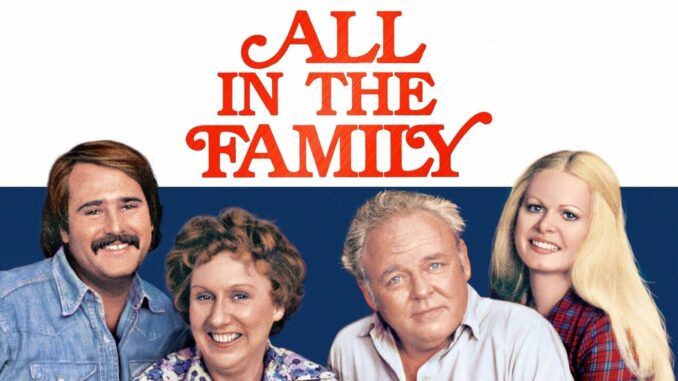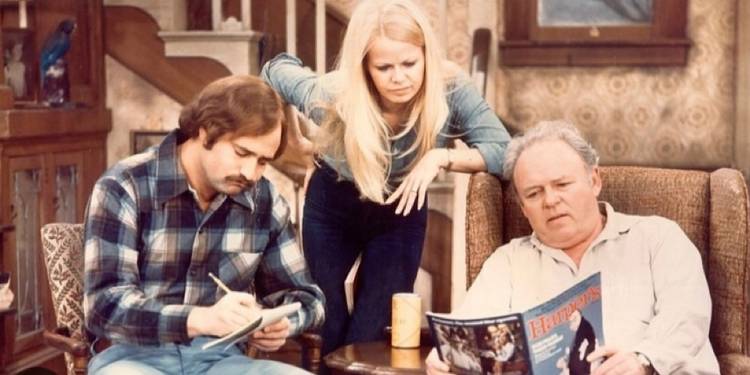
When you think about television that actually mattered—shows that made you laugh, cry, and question the world around you—one name towers above all others: Norman Lear.
He wasn’t just a TV producer; he was a cultural architect. Through his groundbreaking sitcoms in the 1970s and beyond, Lear took on the issues that others were too afraid to touch—racism, sexism, politics, religion—and wrapped them in humor sharp enough to cut through America’s comfort zone.
Norman Lear didn’t just make television; he made conversation. And for nearly two decades, nobody dared change the channel.
Who Was Norman Lear?
Norman Lear was more than a writer or a producer; he was a social storyteller with a mission. Born in 1922 in New Haven, Connecticut, Lear grew up during the Great Depression and served in World War II before turning to comedy writing.
By the late 1960s, TV was still playing it safe—families smiled, problems were small, and controversy stayed off-screen. Lear looked at that landscape and thought, “Why not make people think while they laugh?”
The Birth of a New Kind of Television
“All in the Family” – The Game Changer
In 1971, “All in the Family” hit the airwaves—and America was never the same. Archie Bunker, the loudmouthed, politically incorrect patriarch, became a mirror reflecting the nation’s growing tensions.
Lear’s genius was simple yet bold: take real-life social issues and turn them into comedy without losing their sting. “All in the Family” tackled racism, women’s rights, homosexuality, and class inequality—all during primetime.
And here’s the kicker: it worked. The show didn’t just top the ratings; it started national conversations.
From “Maude” to “Good Times” – Breaking New Ground
After All in the Family came a string of hits, each with its own voice and message:
-
“Maude” explored feminism, mental health, and abortion in a way no other sitcom dared.
-
“Good Times” celebrated African American resilience while exposing the struggles of poverty.
-
“The Jeffersons” flipped stereotypes on their heads, showing a successful Black family “movin’ on up.”
Lear’s shows weren’t just funny—they were fearlessly human.
The Norman Lear Formula – Humor with a Purpose
Comedy That Cuts Deep
Lear understood that laughter was the universal language of truth. His comedy made people comfortable enough to face uncomfortable ideas.
He used humor as a Trojan horse, sneaking social awareness into America’s living rooms one punchline at a time.
Relatable Characters, Real Problems
Lear’s characters weren’t perfect heroes; they were flawed, relatable, and painfully real.
Archie Bunker, Florida Evans, George Jefferson—each represented a slice of America. They argued, made mistakes, and forced viewers to confront their own biases.
The Social Impact of Lear’s Television

Shifting the Cultural Conversation
Before Norman Lear, sitcoms were about escapism. After him, they became mirrors of society.
His shows brought dinner-table debates into the public sphere. People who disagreed politically still watched together—and they talked.
Representation That Mattered
Lear gave underrepresented communities visibility on screen.
He showcased strong women, working-class families, and people of color—not as side characters, but as the heart of the story.
That inclusivity wasn’t performative; it was revolutionary.
Lear’s Legacy Beyond Television
Activism Off-Screen
Lear didn’t stop at TV. In 1981, he founded People for the American Way, an organization promoting democracy, free speech, and equality.
He believed media could—and should—be a force for good, challenging viewers to think critically about the world around them.
Inspiring a New Generation of Storytellers
Writers and creators like Shonda Rhimes, Tina Fey, and Seth MacFarlane all owe a debt to Lear.
His work paved the way for socially conscious shows like Black-ish, The Office, and Modern Family.
Why No One Changed the Channel
Lear didn’t follow trends; he created them. His shows were unpredictable, funny, and painfully honest. People tuned in not just for entertainment but for enlightenment.
Even those who disagreed with the message couldn’t look away. That’s the mark of a storyteller who understands the human condition: he didn’t divide people—he engaged them.
Norman Lear’s Influence on Today’s Media
Modern TV owes its edge to Norman Lear.
Every time you see a show tackle politics, identity, or social justice with humor—think The Daily Show, Brooklyn Nine-Nine, or Ted Lasso—you’re watching Lear’s DNA in action.
He proved that television could be both a mirror and a megaphone, reflecting reality while amplifying truth.
Lear’s Philosophy – “Laugh, But Don’t Look Away”
Norman Lear believed that laughter could open doors that anger kept closed.
He once said, “The foolishness of the human condition is the most relatable thing we share.”
That philosophy is why his work feels timeless. The jokes might age, but the humanity never does.
Awards, Accolades, and Eternal Relevance
Lear’s shelf is packed: multiple Emmys, a Kennedy Center Honor, and the National Medal of Arts.
But his true achievement isn’t measured in trophies—it’s measured in hearts and minds changed.
His shows made people laugh, yes—but more importantly, they made people think.
Lear’s Final Act – A Legacy That Lives Forever
Even into his 90s and 100s, Lear continued producing and inspiring. His remakes of One Day at a Time and his appearances at TV reunions proved that his voice still mattered.
In an era of fast content and fleeting fame, Norman Lear’s work stands as a masterclass in storytelling with purpose.
Why Norman Lear Still Matters in 2025
The issues he wrote about—racism, class, gender equality, political division—are still relevant today.
Lear showed us that laughter could break barriers faster than anger ever could.
He didn’t just change TV; he changed the way we use TV—as a space for empathy, awareness, and truth.
Conclusion: The Man Who Made Us Laugh, Think, and Change
Norman Lear wasn’t just a producer—he was a teacher disguised as a comedian.
He made America laugh at itself, learn from itself, and love itself a little more honestly.
Decades after All in the Family first aired, we’re still talking about the conversations he started.
Because when Norman Lear changed television, no one dared change the channel.
FAQs
1. What was Norman Lear’s most famous TV show?
All in the Family is widely regarded as Norman Lear’s most iconic and influential work.
2. How did Norman Lear influence modern television?
He introduced realism and social commentary to sitcoms, paving the way for socially conscious shows that blend humor with meaning.
3. What made Lear’s shows different from other sitcoms of the time?
His shows addressed taboo topics—racism, feminism, and politics—using humor to make viewers think without turning away.
4. Did Norman Lear receive any major awards?
Yes, Lear earned multiple Emmy Awards, the Kennedy Center Honor, and the National Medal of Arts for his contributions to American culture.
5. Why is Norman Lear’s legacy still important today?
Because the issues he highlighted—inequality, division, and human empathy—are timeless, and his storytelling remains a blueprint for meaningful entertainment.
